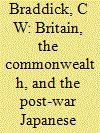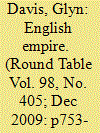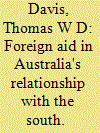|
|
|
Sort Order |
|
|
|
Items / Page
|
|
|
|
|
|
|
| Srl | Item |
| 1 |
ID:
098437


|
|
|
|
|
| Publication |
2010.
|
| Summary/Abstract |
During the early post-war era, a Japanese revival was a source of profound concern to members of the Commonwealth, especially Australia and New Zealand. Britain, having abdicated the leading role in the Western Pacific to the United States, attempted to retain some influence in the region, but economic frailties and lack of Commonwealth unity undermined these efforts. Under American guidance, diplomatic, commercial and (to a lesser extent) security ties with Japan were later promoted, but elements of cooperation and competition persisted in Commonwealth relations with their former enemy. Ultimately, Britain, Australia and New Zealand placed their respective regional identities ahead of their Commonwealth loyalties. Japan took advantage of this situation to promote its own national interests. Hence, the wider aperture of the 'Commonwealth lens' throws into sharp relief the contours of a number of members' bilateral relationships with Japan.
|
|
|
|
|
|
|
|
|
|
|
|
|
|
|
|
| 2 |
ID:
092168


|
|
|
|
|
| Publication |
2009.
|
| Summary/Abstract |
Australia in the 1950s received and subsidised its first international students from neighbouring Asian countries under the Colombo Plan to train 'the expert minds' necessary for development. During the 1980s subsidies were phased out, but the number of international students greatly increased. Migration rules based on points encouraged such students to become skilled migrants. Globalisation brought massive increases in student numbers and competition for revenue from their fees. English-speaking countries have market advantages because of the 'empire' of the United States; but it is dangerous to become over-reliant on overseas fee income. Public funding and curriculum structures need reform.
|
|
|
|
|
|
|
|
|
|
|
|
|
|
|
|
| 3 |
ID:
108145


|
|
|
|
|
| Publication |
2011.
|
| Summary/Abstract |
In identifying the determinants of Australia's foreign aid relationship with developing countries (sometimes labelled 'the South'), this article examines the institutional history of official Australian development assistance since the Second World War. Several, often competing, narratives are delineated. These include: an ongoing questioning within the aid 'policy community', such as it is, of the purpose of foreign aid and the nature of its relationship to foreign policy; bureaucratic contestation over access to foreign aid resources; the desire of Australian foreign aid decision-makers to ensure their control, increasingly via managerialist methods, of aid delivery; and an avoidance by decision-makers of viewing the South as a politically relevant entity. Taken together, these narratives portray an aid programme that has become more 'professionalised' over time, but which finds itself institutionally inhibited from engaging meaningfully with the political nature of international development relationships.
|
|
|
|
|
|
|
|
|
|
|
|
|
|
|
|
| 4 |
ID:
163130


|
|
|
|
|
| Summary/Abstract |
War is antithetical to development. Development, for most mainstream observers, means economic growth, or at least stability, and an increasing quality of life for all, and it cannot exist in a state of war. Yet official development assistance (ODA), one of the primary mechanisms by which many governments and civil society organizations attempt to achieve development in impoverished economies, has a history rooted in war. This paper will explore how the Second World War and its aftermath influenced the creation of Canadian ODA and international development NGOs. While Canada's aid history is most commonly associated with the Canadian International Development Agency, examining this earlier period helps contextualize current debates about the securitization of aid and its harmonization with other aspects of Canadian foreign policy. Using the Unitarian Service Committee (USC) Canada as a case study, this paper will also track its transition from a postwar humanitarian relief agency to a mainstream international development NGO. For Canadian ODA and civil society organizations, the Second World War shaped the legacy of the postwar aid regime and created lasting consequences for its operation.
|
|
|
|
|
|
|
|
|
|
|
|
|
|
|
|
|
|
|
|
|